 |
 |
 |
 |
 |
 |
 |
 |
 |
European Cup semi-final 1st leg - Elland Road - 45,505
Scorers: None
Leeds United: Sprake, Reaney, Cooper, Bremner (Bates), Charlton, Madeley, Lorimer, Clarke, Jones, Giles, Gray
Celtic: Williams, Hay, Gemmell, Murdoch, McNeill, Brogan, Johnstone, Connelly (Hughes), Wallace, Auld, Lennox
The eloquent and loquacious Green, so often accused of hyperbole,
got it absolutely right on this occasion, for the contest between
two clubs who were each battling for their own treble of League,
Cup and European Cup quickly assumed the status of Britain's club
championship, an objective means of settling the heated debate
about national superiority. Of course, the presence of Bremner,
Lorimer and Gray in the United side, bolstered by a Welshman and
an Irishman devalued the currency of Leeds as representing England.
Or is that quibbling? The football poet, Seamus Murphy captured the simmering rage of football
followers north of the border, when he penned the following poem in later
years: One day down in England in the year 69 Murphy's piece was slanted and one-eyed for sure, but no more so than
the English press in the weeks leading up to the game, who regularly trotted
out the lazy epithet of 'the most professional club in Britain' when writing
about United, always implying that there was no doubt that Leeds would
be the victors. The Daily Mirror That came as a bit of a red rag to the bull of Scottish football,
which had always defended its standing with jingoistic fervour
against any claims of Sassenach superiority. Scotland's claims
to be the new world champions after in 1967 becoming the first
nation to beat Ramsey's World Cup winners was the starkest evidence
of the trait. The English writers really should have known better, for Celtic, though
competing in a league where they were indeed mighty fish in the tiniest
of pools, had proven their credentials on the high profile fields of European
competition. They had been honed by manager Jock Stein into a formidable
combination, becoming the first British side to win the European Cup in
1967. Their accomplishment in beating Manchester United to the honour
by 12 months was another boost to national pride, as was the fact that
the Lisbon Lions were all born within thirty miles of Parkhead. They were
about to win the fifth of nine consecutive Scottish league titles under
Stein's leadership. After the draw, Stein commented, 'It would have been a wonderful final
for British football if it had happened, but it hasn't and we have to
carry on. It was because I was thinking that way, thinking about an all-British
final that I hadn't looked at the semi final possibility. I honestly felt
that we were destined to meet in Milan. But now I have adjusted to the
fact that we are drawn together in the semi-final and I can assure you
that I can scarcely wait for the games to begin. We know Leeds and we
respect them too, but we are not frightened of them. I think these will
be great, great games.' His outside-left, Bobby Lennox, was rather more forthcoming in his 2007
autobiography: 'We had already comfortably won our fifth successive league
title and were once again en route to the final of the European Cup, having
eliminated Basle, Benfica and Fiorentina - the last two being top quality
sides. That had taken us into a semi final with Leeds United and there,
it was widely predicted in the English press, our little sortie in the
1969/70 European Cup was destined to end. The English press and television
people, with supreme arrogance, claimed that Leeds United were unstoppable
that season and were champions of Europe in all but name. Those media
people failed to consider whether some other teams in the competition
might rival the talents of the club they were championing. 'A lot was said about the Scottish League being inferior to the English
League but at Celtic we were forced by Jock Stein to maintain a set of
specific standards ... if Leeds had thought they were coming up against
an amateurish mob from an unprofessional league, they were wrong.' Don Revie was great friends with
Stein and the two had together attended the 1969 Open golf championship
at Royal Lytham and St Anne's, watching Tony Jacklin's triumph. Revie
described Celtic as 'a fantastic club, and a fantastic side ... It's going
to be a tough task in Scotland if we don't take a lead for on their own
territory they are great ... We have not found any cracks in their side
in the matches we have played against them or in the three we've seen
them recently.' Revie's assistant, Maurice Lindley, watched Celtic beat Ayr United 3-0
in the week of the game and commented, 'I saw enough to realise that this
match with Celtic will be the toughest we have ever had to play in almost
10 years of European competition.' Stein went to see Leeds play for the third time in 12 days when he watched
them beat Manchester United in their FA Cup semi-final second replay at
Bolton on 26 March. He said afterwards, 'Leeds are a fine team and played
well, but I do not think they are as good as people make out down in England.
There is talk about the fixture problem they face, but I don't think this
is a factor in our forthcoming matches with Leeds. We played more games
when winning the European Cup than Leeds will have done at the end of
the season.' Stein was It was the most punishing of schedules and in the circumstances it was
understandable that Don Revie had accepted that the chase for the championship
was a step too far, even for Leeds. He started resting first teamers for
League games, relying on youngsters and reserves to make up the numbers. For the Southampton match, Reaney, Cooper, Bremner, Hunter, Jones
and Giles were all missing, Eddie Gray wore the No 6 shirt and
Revie called up Bates, Belfitt,
Hibbitt, Yorath and Davey
from his second string. After an unlucky 3-1 defeat, the manager
took even more drastic action for the Derby clash, fielding an
eleven consisting entirely of reserves, with three men making
their first League start (Galvin, Peterson
and Kennedy). The Football League threatened an inquiry. Leeds claimed that
they had asked Derby to postpone the match, only for County's
directors to refuse. However, Alan
Hardaker, secretary of the Football League, stated later that
he had presented Leeds with a variety of convenient dates to rearrange
the fixtures, but that Leeds had rejected them all. Hardaker and
Revie were well known not to get on and became bitter enemies
over the years. The United manager was unrepentant, saying: 'The League have not yet
asked us to provide medical certificates, but we shall do so if required;
and if there is a League inquiry into the matter, then we shall provide
all the evidence that they want. If similar circumstances arose again
I should do exactly the same thing. And if we had been playing Chelsea
at Wembley last Saturday instead of Southampton at Elland Road, I should
have had to choose the same side as I did then. I think most people understand
our predicament, and I imagine that quite a few clubs would have done
the same thing in our position. There simply was nothing else we could
have done in view of the advice from the club doctor.' Stein was quick to capitalise on Revie's readiness to surrender the championship,
telling his men: 'Leeds have shown us so much respect that it has cost
them the league. But they must chase the game because supporters expect
victory at home and they won't allow them too long to score.' There was also a fierce dispute between the two clubs about ticketing
arrangements. Celtic fans were ready to travel in force to the
first leg in Yorkshire, even though United were charging double
the prices that applied for their quarter final against Standard
Liege. Tom Brogan from stateofthegame.co.uk: 'Just hours after the draw
was made Leeds secretary Keith Archer announced that Celtic would be allocated
only 6,000 tickets for the first leg match. This was met with dismay from
Celtic fans. Celtic Supporters' Association Secretary Hugh Delaney said,
"I don't think the allocation is at all fair to our fans. Leeds will
be able to get many more tickets for the match at Hampden." 20,000
fans were expected to want to travel down from Glasgow, so 'Eventually Leeds restricted ticket sales to season tickets and token
holders only. On the Sunday 25,000 Celtic fans queued at Parkhead for
the 6,000 tickets that were on sale, many of them sleeping outside the
ground overnight. A coach load of Leeds United fans were among the first
500 to snap up tickets. That first group of 500 supporters could purchase
up to 4 tickets each. From then on fans were restricted to two tickets
each. Every ticket available for sale sold out, with thousands of stand
tickets being held over for sale at an undisclosed home game. 'Despite being allocated only 6,000 tickets, 10,000 Celtic fans were
travelling down to Leeds by any means available to them. British Rail
ran a Football Special departing Glasgow at 12.31 on the afternoon of
the match, arriving at Leeds 5 hours later. The price for a return ticket
was 60/-. A local travel agent had chartered a plane for 100 fans, flying
down in the afternoon and returning to Glasgow after the game. Of the
Celtic fans' arrival the Yorkshire Post wrote, "Nothing had
happened quite like it in Yorkshire since the Roman legions left York."
The entire Celtic support arriving from all parts of Britain was estimated
at 13,000. 'In preparation for the big game Celtic went down to Troon, running on
the beach on Sunday and putting on a practice match in the grounds of
their hotel, to the great delight of the crowds of holidaymakers. They
would take the Leeds train from Kilmarnock on the Tuesday, staying in
Harrogate before the game.' Archie MacPherson in his biography of Stein: 'Celtic travelled by train
to Leeds and reserved a special carriage for themselves. What they hadn't
realised was that a famous Scottish comedian managed to get into their
area. He happened to be Lex McLean, one of the most renowned Rangers supporters
of that period, who wrote songs about the Ibrox club that echo to this
day. However, from the moment the train left
Glasgow until it got into Leeds, McLean, who was going to see the game
himself, entered into the spirit of the occasion and entertained the squad
with his ribald humour which left them in a buoyant, optimistic mood.
Never before had a Rangers sympathiser done so much to prepare a Celtic
team psychologically, to bolster morale, and probably never since. Stein
later repaid this gesture by appearing on McLean's television show, playing
straight man to a well-known "blue-nose" comic. 'Stein had great respect for Don Revie, the Leeds manager, as an original
thinker in the game, but he did not think Celtic deserved the treatment
they received both before and after the match. The English press annoyed
him by writing off his team as no hopers. Revie did not help matters by
being irritating. As both teams normally wore white stockings the visitors
had to change, but as Celtic did not have an adequate replacement the
Leeds manager offered them two alternatives Stein won all the pre-match psychological battles, as Bobby Lennox recalled.
;At Elland Road, the playing surface was in terrible condition, as we
discovered when we arrived at the ground. Jock, who was always adept at
mind games, told us that we were to pretend to the Leeds players that
our pitch in Glasgow was even worse. An hour or so prior to the match
we were standing in our suits inside the tunnel when Billy Bremner came
up to us and said, "What about that pitch of ours? What do you make
of it?" You could see the shock on his face when we said to him,
"It's fantastic. We're looking forward to playing on that after what
we've been used to back home. Compared to our place, this is like Wembley."' Asked about his team selection, Revie said gloomily, 'I hope it will
be our 100 per cent team, but I don't expect them to be 100 per cent physically
or mentally right after the strain we have undergone this last fortnight.'
Norman Hunter was the only absentee, with the knee injury that he sustained
in the quarter-final against Standard Liege; Paul Madeley deputised. In contrast, Stein was bigging up his men both in public and
behind the scenes. His selection contained seven of their European
Cup-winning eleven and the manager was convinced that wee Jimmy
Johnstone on the right wing would be an ace in the hole. Jim Black from Jinky - The Biography of Jimmy Johnstone: 'Sensing
that Jinky was Celtic's potential match winner, Stein, as he had done
so often in the past, threw himself into the role of psychologist and
set about convincing the little winger that he had no equal among the
opposition's players. Stein constantly interrupted his pre-match team
talks to announce that Jinky was going to destroy Leeds. This had the
effect of boosting Jinky's often fragile confidence to a level so high
that he believed he was bound to prove what his manager predicted.' Johnstone was pitched directly against United left-back Terry Cooper,
widely touted at the time as one of the world's best, but Stein had no
doubts, telling a friend, 'They say this Cooper is a great attacking full-back,
but he's never had this tricky wee dwarf running at him for 90 minutes.' The scene set, the two teams could put all the ballyhoo behind them and
finally kick off on the evening of 1 April. United had yet to concede
a goal in the tournament and Celtic had not scored away from home, but
those records were about to be shredded as the visitors took a lead within
90 seconds of kick off. From Gemmell's deep throw in on the left, Auld launched a huge
up and under into the Leeds half. It came down with snow on it,
near the corner of United's penalty area. The normally reliable
Madeley was on hand to clear but was being harried by Celtic centre-forward
Wallace. Madeley allowed the ball to bounce and then misjudged
its trajectory, getting under it when he tried to head away. That
unsettled the rearguard and Jack
Charlton couldn't get in his attempted clearance. Wallace
had the time and presence of mind to touch the ball back to Connelly,
unmarked on the edge of the box, and the Under-23 international
got in a shot. It took a deflection off Cooper's outstretched
leg which saw it go bobbling out of the reach of Gary Sprake and
rolling in at the back post. Phil Brown in the Yorkshire Evening Post: 'On par form this season,
against a situation United had dealt with hundreds of times, Madeley would
have brought the ball clear, as mere routine. But the numbing grip of
staleness had taken over. Reactions were slower, so limbs moved slower,
too. When one thinks of how brilliantly Madeley - and the others for that
matter - had played this season - oh!' A goal to the good so early on, Celtic had a real foothold and Jinky
Johnstone thereafter took it on himself to give Terry Cooper the chasing
of his life. Cooper, without the reassuring defensive wall of Norman Hunter
behind him, was badly exposed. He had the attack-minded Gray and Giles,
never great defensive stalwarts, in front of him and little cover to speak
of. With Johnstone in irresistible form, Cooper had one of the worst footballing
nights of his life. It also meant that, with his mind brimming over with fears of
what Johnstone might do next, Cooper was reluctant to play his
normal attacking game. At a Jock Stein had ordered his men to beard United in their den and
Celtic took him at his word, with the untamable Johnstone leading
the charge. After six minutes he tricked his way past three men
to make space for a shot from the edge of the area, only to be
denied by Sprake's save. Phil Brown: 'To rub salt in the wound, so to speak, Celtic then gave
little right winger Johnstone lashings of the ball for 20 minutes, and
he was just untackleable then and after. I doubt if Elland Road has ever
seen such feinting, swerving and sidestepping inside a square yard. It
must have been horrible to see such an individual genius on such form
in control and so fleet into the open spaces.' He was aided and abetted in his work by Bobby Murdoch, who constantly
prompted from midfield. After the schemer finished off one smart
move with a fearsome shot which was touched over the bar, Lennox
went narrowly wide from the corner. Albert Barham in The Guardian: 'The tactics seemed obvious but
perhaps they were not. It looked as though Celtic were given orders to
strike quickly at Leeds with all their considerable power, especially
as Don Revie had admitted that after the gruelling succession of matches
his team were neither physically nor mentally fully fit for their crucial
match. 'And struggle they did for after the goal the speed and guile of Johnstone
served Celtic well in this early period. Connelly also played well and
Auld showed he still had a lot of good football still in him. Against
this skilled Celtic attack, Leeds made heavy weather of the opening half
hour and indeed it was not until the 34th minute that they were able to
break the stranglehold. 'Giles and Bremner had worked unceasingly to get Leeds into a scoring
position. They had tried to probe through the centre of the defence. They
had tried to send Cooper and Reaney down the wings but all seemed to fail
against the tall McNeill and Brogan, who nodded Celtic out of trouble.
Then in the 34th minute, Giles lobbed a ball high into the goalmouth.
Williams could not get to it, but Gemmell swept it away off the line as
Jones challenged.' Seven minutes later Lorimer crossed to the near post only for Jones and
Bremner to both miss from close in. Then Bremner manufactured another
opening with a run down the right flank but when he played Lorimer in,
the Scot's shot beat the bar from 14 yards. But if United ended the half on the offensive, it could not disguise
the fact that the Scots had outclassed an off colour home eleven, as reported
by Geoffrey Green in The Times: 'They looked a jaded company, full
of inaccuracies in their passing, faults that could be placed even at
the doorstep of the usually immaculate Bremner and Giles. 'Time after time, too, vast open spaces were carved in their defence
such as one has not seen before all season. In attack, their one ploy
seemed to be the long high cross ball aimed for the heads of Jones and
Clarke. Celtic found little bother in countering that. The Scots in fact
showed a far cleverer variation in their whole game; Auld drew Bremner
into many a false position in midfield as he and Murdoch coolly dominated
the central areas. It is not often that Bremner and Giles have to play
second fiddle in this way. 'With McNeill an immovable lighthouse at the heart of defence, and Hay
outdoing even Leeds in the Don Revie must have hoped that Leeds could revive their hopes after the
break, but they were nearly the victims of another early shock. Before
the first minute had elapsed, Connelly had the ball in the net a second
time. Auld fired a crossfield pass to Johnstone on the byline. He was
harassed closely by Cooper, but managed to slide the ball across to Connelly
who shot home. Fortunately for Leeds, French referee Kitabdjian disallowed
the goal, presumably for offside against Johnstone, though he protested
long and hard. It had looked clearly as if Cooper had played him on. As if acknowledging their fortune, United finally drew themselves together
and forged some kind of control on the game; they certainly created more
chances in the second period, without finding the gilt edged one that
they so badly required. They sensed that an early equaliser was essential if they were to win
the game and thought they'd got it on the hour when Lorimer found Clarke
in space. Unfortunately, he hesitated, perhaps looking for a better placed
team mate and his uncertain effort was saved by goalkeeper Evan Williams,
who blocked with his knees. Shortly afterwards Lorimer, Clarke and Jones
all seemed to be waiting for another to seize the opportunity in front
of a yawning goal when Williams punched loosely. The chance was gone before
any of them could react as Gemmell hoofed clear. Then Clarke received from a Jones header, but lacked his normal control;
Williams dived bravely at his feet to collect the ball. On 58 minutes Bremner was injured. He had fallen to the ground and struck
his head in Celtic's area after a series of Leeds attacks. He struggled
on gamely for ten minutes but was badly dazed. He had to go off with concussion
and double vision to be replaced by Bates. It was clear he knew little
of what was going on as he was helped off the pitch. Terry Lofthouse in the Yorkshire Evening Post: 'Bremner roamed
about dazed and bewildered after being led from the contest in the 67th
minute ... Les Cocker eventually managed to get him off the pitch, and
for another half hour Bremner knew little about what was happening. He
was ordered home and a taxi called. But suddenly he reappeared and went
into the Celtic dressing rooms. Trainer Cocker and the club doctor rushed
from the home dressing room and took the pale looking Bremner back there.
It was quite a while before he regained his composure.' With Bremner's withdrawal some of the fire seemed Another couple of chances came but ended with anxious Leeds players ballooning
them harmlessly over the crossbar. And if Leeds had the volume of opportunities, it was Celtic who had the
quality. Barry Foster in the Yorkshire Post: 'Celtic were always
likely to hit back and Johnstone gave the Leeds defence a timely reminder
of their power six minutes later when he waltzed around three defenders
to set up a shooting chance for Wallace - and what a shot it was, Sprake
bringing off a fine save on his knees.' Geoffrey Green: 'With 10 minutes left Celtic, smoothing the ball around,
changing the angles, slowing the pace, and altering the rhythm, brought
on Hughes, the strong running express engine as a tactical substitute
for the stylish Connelly, who had more than played his part in helping
Murdoch and Auld in midfield to set up the play for the elusive little
Johnstone. Leeds beat the breath out of themselves to the very end. But
it was not to be on a day which had brought flurries of snow and a chilly
but clear night with a yielding surface under foot.' Celtic retained their slim advantage to the end of the game. It was a
grim outcome for Don Revie's men, and he acknowledged as much afterwards.
'Celtic were the better side and deserved their victory. Every one of
them was magnificent. It makes it very hard for us at Hampden, but we
are still not out of it. Anything can happen when we play the return game.' Jock Stein was triumphant: 'They have laughed at our football long enough
down here. I'm not talking about Leeds United or Don Revie, they have
respect for us. I'm talking about the critics and commentators who have
rarely given credit to Scottish football. Maybe tonight's result will
stop them laughing.' He added a final note of caution, 'This is only half-time,
we have another 90 minutes to play at Hampden.' The Glasgow Evening Times gloated, 'Make no mistake about it,
Celtic showed Leeds the way home. They unhinged this "most professional"
of teams in every phase of the game. They were so impressive in doing
so that even the English journalists, who cannot see past England and
anything English, were silenced by Celtic's treatment of the machine.' Jimmy Johnstone got all the plaudits after the game of his life, and
it was widely suggested that he had proven himself better than George
Best. He ignored the claims, saying, 'They Stein's assistant Sean Fallon spoke later of the winger's brilliant display:
'Leeds was just one of his great games. He really turned it on that night.
They were so confident about the first leg down there. Not that Don and
his people were shouting about what they would do. It was the English
newspapers who were doing that. But still Don and the rest of them were
quietly confident that they would get a result to bring with them to Hampden.
We surprised them, and no one had more surprises for them that night than
wee Jimmy.' Phil Brown summed up United's despair and emptiness in the Yorkshire
Evening Post the following day: 'Whoever it was in Leeds United jerseys
that Celtic beat 1-0 at Elland Road in the European Cup semi-final, it
was not Leeds United. With the exception of Sprake, the men who have dominated
the English season for months were unrecognisable. Celtic were so dominant
that United did well to keep hope alive and the score to only 1-0. Indomitable
Don Revie held out, "There's only a goal lead after all. We have
not given up hope of winning the return at Hampden." Allowing United's
task will be toweringly difficult, they could do it, too. 'Last night his team found that the elastic had gone, its strength taken
by the surely impossible rigours of this World Cup shortened season for
a successful English club in the hardest League in the world. Incidentally,
discussing this matter of strain with Dutch, West German and French sports
editors last night, they all admitted frankly that they could not visualise
even the best of their clubs tackling our league season in the time allowed
this year, and winning cups as well. 'United were beaten for pace, starting and in flight, accuracy, reading
of the game, intelligence and in skill on the ball last night. Celtic,
fine side as they are, experienced as they are, ruthless as they are,
did not miss a trick.'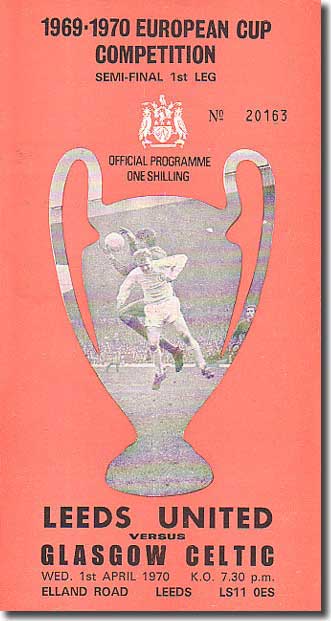 Geoffrey
Green in The Times on 21 March 1970: 'When Leeds and Celtic were
paired in the European Cup, groans of disappointment all over the Roman
chamber greeted the announcement. Certainly it was the last thing wanted
both north and south of the River Tweed as everybody had hoped that these
two would fashion the first all-British climax. As it is, both clubs can
now consider this as the real final, though that, of course, will be of
small consolation to the loser.'
Geoffrey
Green in The Times on 21 March 1970: 'When Leeds and Celtic were
paired in the European Cup, groans of disappointment all over the Roman
chamber greeted the announcement. Certainly it was the last thing wanted
both north and south of the River Tweed as everybody had hoped that these
two would fashion the first all-British climax. As it is, both clubs can
now consider this as the real final, though that, of course, will be of
small consolation to the loser.'
The great Leeds United were on cloud number 9,
They'd just become champs and were over the moon,
Next season in Europe just can't come too soon.
'They're the best team in Europe' said the bold English press
'They'll take on all-comers from the east to the west,
There's no one can match them for speed and for skill,
And to watch them in action gives punters a thrill.'
Well Revie's brave heroes were quick off the mark
They thrashed the Norwegians and Slavs off the park
They beat off the Belgians from Standard Liege
And were drawn to meet Celtic at the semi-final stage.
Now the Fleet Street pen-pushers were having a ball
They were slagging the Celtic and Scottish football,
'A big fish with minnows in such a small pool
They can't match the league where the mighty Leeds rule'.
'It's the Battle of Britain', said the man from the Mail,
'And the Leeds will beat Celtic, for sure, without fail,
Our English League champs will fill our hearts with pride,
And we'll take those Jock chancers all the way for a ride'.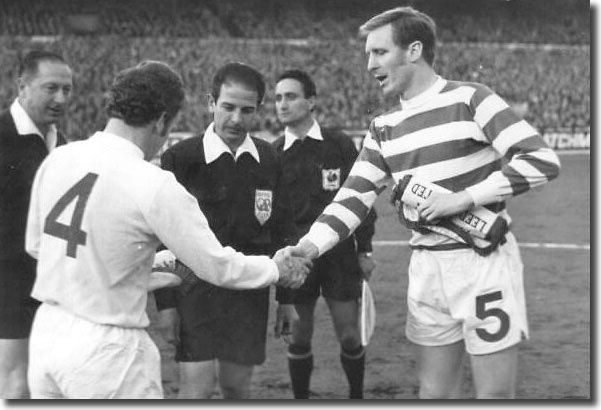 was typical of Fleet Street's finest: 'I should
hate to be in Glasgow on the night when dreams are broken. Because for
all of their support and belief, I do not regard Celtic as good enough
to achieve what has proved beyond others in Britain.'
was typical of Fleet Street's finest: 'I should
hate to be in Glasgow on the night when dreams are broken. Because for
all of their support and belief, I do not regard Celtic as good enough
to achieve what has proved beyond others in Britain.'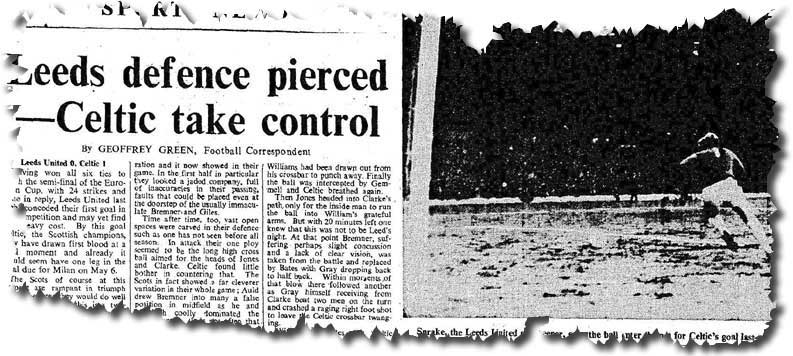 right, but what his words concealed was the sheer intensity
of United's fixture congestion. The two replays that they required
to see off Manchester in the FA Cup meant that in the 15 days
from 21 March to 4 April they had to play eight times:
right, but what his words concealed was the sheer intensity
of United's fixture congestion. The two replays that they required
to see off Manchester in the FA Cup meant that in the 15 days
from 21 March to 4 April they had to play eight times:
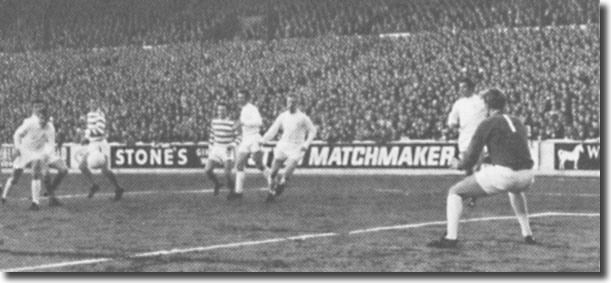 to
be allocated less than a third of that number was a blow for the supporters.
"We have to consider our own fans," said Archer. "For these
big games we can attract 48,000 fans and they are OUR fans. They have
to come first so we simply couldn't give away any more of our tickets
to Celtic." He continued, "I know that Celtic could probably
fill half the ground down here, but there's nothing else we can do."
to
be allocated less than a third of that number was a blow for the supporters.
"We have to consider our own fans," said Archer. "For these
big games we can attract 48,000 fans and they are OUR fans. They have
to come first so we simply couldn't give away any more of our tickets
to Celtic." He continued, "I know that Celtic could probably
fill half the ground down here, but there's nothing else we can do."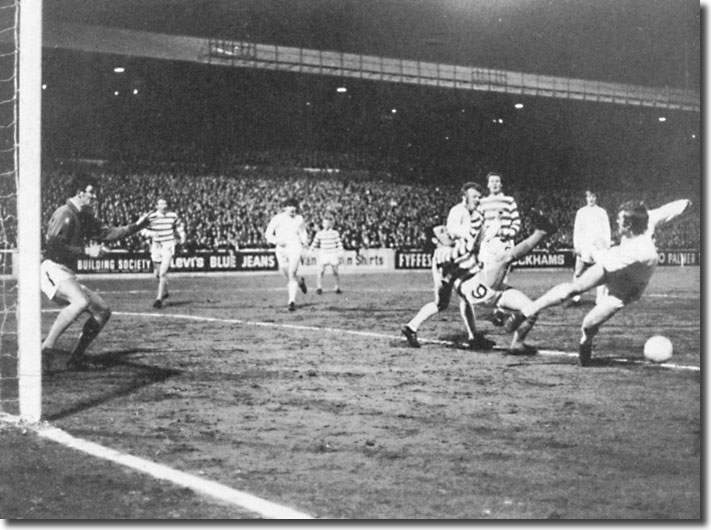 that were to hand. The colours were blue or red. "Aghast" was
certainly not the word bandied about the Celtic dressing room at that
choice. A Celtic team with red or blue would have tested the loyalty of
their support to the limit. What to do? Stein's humour soothed the savage
breasts. He kept any anger about that confined to the dressing room so
that Leeds would not detect they had been upset. "We'll wear the
red stockings," he said. "Under their floodlights they'll show
up more orange than red and our supporters will think we're wearing the
colours of the Irish tricolour. That'll please them." It did.'
that were to hand. The colours were blue or red. "Aghast" was
certainly not the word bandied about the Celtic dressing room at that
choice. A Celtic team with red or blue would have tested the loyalty of
their support to the limit. What to do? Stein's humour soothed the savage
breasts. He kept any anger about that confined to the dressing room so
that Leeds would not detect they had been upset. "We'll wear the
red stockings," he said. "Under their floodlights they'll show
up more orange than red and our supporters will think we're wearing the
colours of the Irish tricolour. That'll please them." It did.'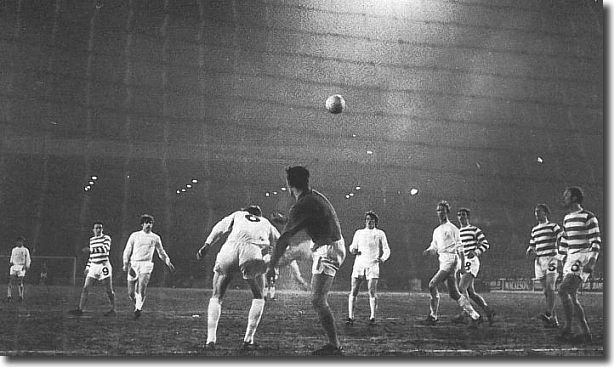 stroke, a key component of United's
attacking game was neutered.
stroke, a key component of United's
attacking game was neutered.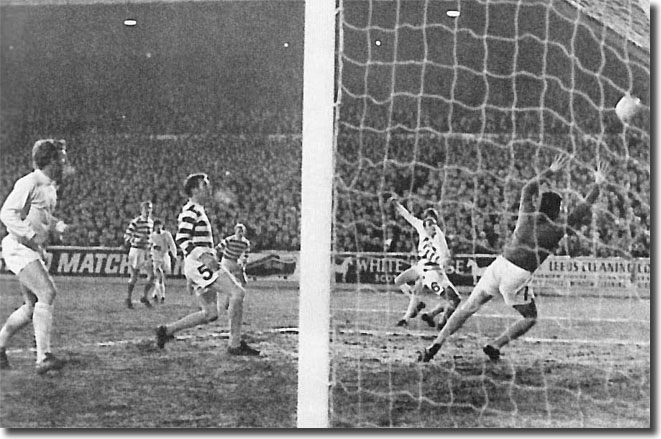 matter of overlapping from full-back, it was Celtic who held all the cards
up to half-time. They held them in attack through the superb, dribbling
of little Johnstone who, like a wasp, buzzed here and there with close
footwork and acceleration round, and often through, an alarmed Leeds defence.
Johnstone with his low centre of gravity was as elusive as a piece of
wet soap in a shower bath.'
matter of overlapping from full-back, it was Celtic who held all the cards
up to half-time. They held them in attack through the superb, dribbling
of little Johnstone who, like a wasp, buzzed here and there with close
footwork and acceleration round, and often through, an alarmed Leeds defence.
Johnstone with his low centre of gravity was as elusive as a piece of
wet soap in a shower bath.'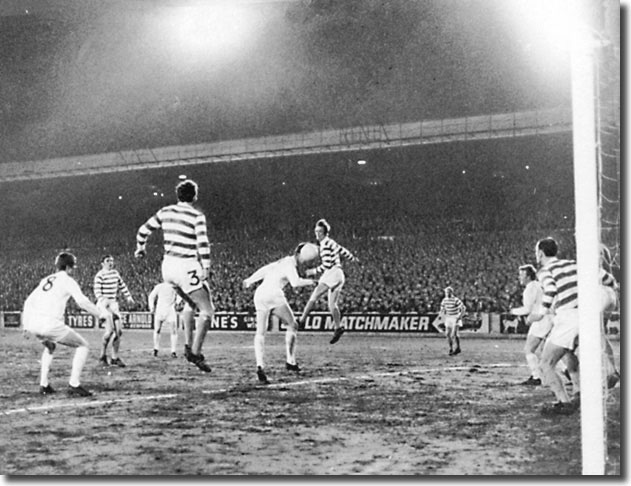 to go out of the United
work, though Gray came close in the 72nd minute. He turned past two men,
hiding his intentions until the last minute, superbly concealing a fearsome
right-footed drive until he struck it from the ruck. It "made the crossbar
twang like a bowstring" (Albert Barham).
to go out of the United
work, though Gray came close in the 72nd minute. He turned past two men,
hiding his intentions until the last minute, superbly concealing a fearsome
right-footed drive until he struck it from the ruck. It "made the crossbar
twang like a bowstring" (Albert Barham).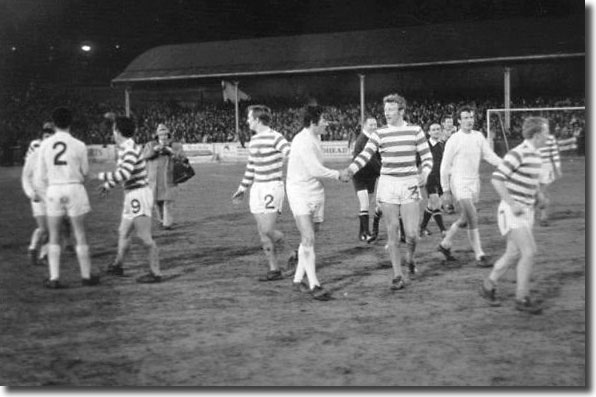 can
put all the valuations they like on me, they can compare me with any player
they like. I don't care! I know people are saying I must be worth a quarter
of a million pounds, but as far as I am concerned I am a Celtic player
and I always will be a Celtic player. It was my best game at European
Cup or international standard. But the whole team played so well. We wanted
to do it so much.'
can
put all the valuations they like on me, they can compare me with any player
they like. I don't care! I know people are saying I must be worth a quarter
of a million pounds, but as far as I am concerned I am a Celtic player
and I always will be a Celtic player. It was my best game at European
Cup or international standard. But the whole team played so well. We wanted
to do it so much.'